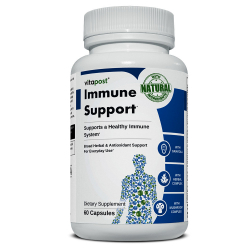
In the intricate dance of life, our immune system takes center stage as the vigilant guardian of our health. Its role is not just reactive, responding to invaders, but proactive in maintaining the delicate balance within our bodies. A robust immune system serves as a shield, defending against a myriad of pathogens, from bacteria and viruses to more complex intruders
The importance of a strong immune system extends beyond merely fending off illnesses. It plays a pivotal role in the body’s ability to recover and adapt, influencing the overall quality of life. A resilient immune system is the cornerstone of longevity and vitality.
Overview of Factors Affecting Immunity
Understanding the factors that sway the effectiveness of our immune system is paramount. It is a symphony of elements, delicately intertwined and constantly influenced by our lifestyle, environment, and genetic makeup.
Nutrition:
The fuel for our immune system comes from the nutrients we consume. A balanced diet rich in vitamins, minerals, and antioxidants fortifies our defenses, while deficiencies can compromise its efficacy.
Lifestyle Choices:
Regular exercise, sufficient sleep, and stress management all contribute to the harmony of a well-functioning immune system. Conversely, a sedentary lifestyle, chronic sleep deprivation, and unmanaged stress can weaken our defenses.
Hygiene Practices:
Simple acts, such as handwashing and maintaining personal hygiene, are the frontline defenses against infections. Additionally, vaccinations serve as crucial reinforcements, preparing the immune system to combat specific threats
Gut Health:
The gut houses a significant portion of our immune cells. A healthy gut microbiome, nurtured by a diet rich in fiber and probiotics, is essential for robust immune function.
Environmental Influences:
Exposure to fresh air, sunlight, and a clean living space contributes to a supportive environment for our immune system. Conversely, pollution and exposure to harmful substances can act as stressors.
Genetic Factors:
While some aspects of our immune response are genetically determined, lifestyle choices can significantly influence how our genes express themselves in relation to immune function.
In this comprehensive exploration, we delve into each of these factors, unraveling the intricate web that shapes our immune resilience. As we navigate through the realms of nutrition, lifestyle, hygiene, gut health, environment, and genetics, we will uncover actionable insights to empower individuals in fostering a robust and vigilant immune system.
I- Nutritional Strategies
A- Power of a Balanced Diet

A cornerstone of immune health lies in the sustenance we provide our bodies through a balanced diet. A well-rounded and varied selection of foods ensures that our immune system receives the diverse array of nutrients it requires to function optimally.
1- Macronutrients:Proteins:
Essential for the production of antibodies and immune system cells.Carbohydrates: Provide energy for immune cells.Healthy Fats: Support immune function and reduce inflammation.
2- Micronutrients:
Vitamins (A, C, D, E, B-vitamins): Play vital roles in immune response and overall health.Minerals (Zinc, Selenium, Iron): Essential for various immune processes
3- Antioxidants:
Abundant in fruits and vegetables, antioxidants protect cells from oxidative stress, promoting a resilient immune system.
4-:Fiber:
Supports a healthy gut microbiome, indirectly enhancing immune function.
B- Immune-Boosting Foods and Supplements
1- Citrus Fruits:
Rich in vitamin C, a potent antioxidant crucial for immune cell function.
2- Garlic:
Contains allicin, known for its immune-boosting properties.
3- Yogurt and Probiotics:
Support gut health and positively influence immune responses.
4- Berries:
Packed with antioxidants and vitamins beneficial for immune function.
5-Leafy Greens:
High in vitamins, minerals, and antioxidants that bolster immunity
6- Nuts and Seeds:
Provide healthy fats, zinc, and selenium, contributing to immune health.
7- Mushrooms:
Certain varieties, like shiitake and maitake, have immune-modulating properties.
8- Supplements:
Consider supplements to fill nutrient gaps, especially in cases of deficiencies or specific dietary restrictions
Our Hand-picked Top Immunity Boosting Supplements

NuviaLab Immune
✓ NuviaLab Immune is a food supplement, which supports the functioning of the immune system in a comprehensive way. The product contains the highest quality plant extracts that help increase immunity and accelerate regeneration.
✓ NuviaLab Immune capsules are a combination of 7 natural ingredients, such as: Japanese pearl flower extract, yeast extract, elderberry extract, rosehip extract, zinc, rutin and high dose of vitamin D.
✓ The product’s ingredients: Support immune system function, Soothe irritation of the upper respiratory tract, Protect cells from oxidative stress, Reduce feelings of fatigue and tiredness & Contribute to better wound healing.

Immune Complex
✓ Immune Complex provides vitamins, zinc, probiotics and herbal extracts in a convenient, once-a-day serving. The immune system is a complicated machine, so Immune Complex offers many different kinds of support in one dietary supplement.
✓ Covering four different approaches to the nourishment of a healthy immune system, Immune Complex provides vitamins, zinc, probiotics and herbal extracts in a convenient, once-a-day serving. The immune system is a complicated machine, so Immune Complex offers many different kinds of support in one dietary supplement.
✓ All over the natural health media you’ll find exciting news about the botanical ingredients found in Immune Complex. Elderberry, Garlic and Echinacea all have been the subject of research that suggests support for a healthy immune system. Curcuminoids (from Turmeric) are special, providing powerful antioxidant potential that can support the body through normal oxidative stress.
✓ Immune Complex is made in the US within an FDA registered facility that follows GMP guidelines. Ingredients in the formula are both domestic and imported

Immune Support
✓ The immune system is hugely complicated. It fights off an unbelievable number of offensive bacteria, fungi and viruses every day, as well as being responsible for the clean-up of dead or damaged cells throughout the body.
✓ Immune Support aims to provide a wide range of nutrients, vitamins and botanical extracts to support a healthy immune system in as many ways as possible.
✓ Advanced Extracts: Both Beta-Glucans from Saccharomyces cerevisiae and Arabinogalactan from larch are special kinds of carbohydrate that support the immune system. Scientists think the body associates Beta-Glucans with pathogenic microorganisms and so reacts accordingly. A similar rationale is applied to Arabinogalactan.
✓ Herbals From East and West: Green tea is widely consumed for its powerful antioxidant properties. It also has other specific benefits in support of the immune system. Graviola is a large spiky fruit from the Americas, and its leaves possess properties that when taken as a dietary supplement can also support a healthy immune system. Panax ginseng, Olive leaf, Cat’s Claw, Grape Seed, Pine Bark and Pomegranate make this formula truly international, taking the best from many lands and cultures.
C- Importance of Hydration
1- Cellular Function:
Adequate hydration is essential for optimal cellular function, including immune cells.
2- Lymphatic System Support:
Proper hydration helps maintain the flow of lymph, which carries immune cells throughout the body.
3- Mucosal Immunity:
Hydration is crucial for mucous membrane health, the first line of defense against pathogens.
4- Toxin Elimination:
Water aids in the elimination of toxins, reducing the burden on the immune system.
5- Electrolyte Balance:
Maintaining the balance of electrolytes is vital for immune cell communication and function
In this nutritional journey, we explore not only the general principles of a balanced diet but also specific immune-boosting foods and the role of hydration in supporting overall immune health. Adopting these nutritional strategies empowers individuals to fortify their immune systems from within, providing a solid foundation for resilience against external threats.
II- Lifestyle Modifications
A- Regular Exercise and Its Impact on Immunity

Exercise is not only a catalyst for physical fitness but also a potent modulator of the immune system.
1- Enhanced Circulation:
Physical activity promotes better blood circulation, allowing immune cells to move more freely throughout the body.
2- Improved Immune Cell Function:
Regular exercise has been linked to heightened activity levels of various immune cells, contributing to a more effective defense against infections.
3- Anti-Inflammatory Effects:
Moderate exercise helps regulate inflammation, preventing chronic inflammation, which can compromise the immune system.
4- Temperature Elevation:
Elevated body temperature during and after exercise may help prevent bacterial growth, acting like a natural defense mechanism.
5- Stress Reduction:
Exercise is a natural stress reliever, and chronic stress is known to negatively impact the immune system.
6- Balance is Key:
Excessive exercise, however, can have the opposite effect, temporarily suppressing the immune system. Striking a balance is crucial.
B- Sufficient Sleep as a Key Factor
Quality sleep is a cornerstone of overall health and plays a pivotal role in immune function.
1- Restorative Processes:
During sleep, the body undergoes essential processes, such as tissue repair, hormone regulation, and the strengthening of immune responses.
2- Cytokine Production:
Sleep influences the production of cytokines, proteins that play a key role in immune signaling.
3- Memory and Learning:
Adequate sleep is vital for optimal cognitive function, which indirectly supports stress management and immune health.
4- Consistent Sleep Patterns:
Maintaining consistent sleep schedules enhances the circadian rhythm, positively impacting immune function.
5- Quantity and Quality:
Both the duration and quality of sleep matter. Aim for 7-9 hours of restful sleep each night.
C- Stress Management Techniques
1- Mindfulness Meditation:
Practices like mindfulness meditation help reduce stress and promote a sense of calm, positively impacting immune function.
2- Deep Breathing Exercises:
Controlled breathing techniques activate the parasympathetic nervous system, countering the stress response.
3- Regular Physical Activity:
Exercise not only contributes directly to immune health but also serves as a powerful stress management tool.
4- Social Connections:
Maintaining strong social ties provides emotional support, buffering against the negative effects of stress.
5- Hobbies and Leisure Activities:
Engaging in activities that bring joy and relaxation can counteract stress and contribute to overall well-being.
6- Healthy Work-Life Balance:
Balancing professional and personal life helps prevent chronic stress, fostering a healthier immune system.
By incorporating regular exercise, prioritizing sufficient and quality sleep, and adopting stress management techniques, individuals can create a lifestyle that supports and enhances their immune resilience. These lifestyle modifications are not only beneficial for immediate well-being but also contribute to long-term health and vitality.
III- Hygiene Practices
A- Importance of Handwashing and Personal Hygiene

1- Barrier Against Infections:
Handwashing is a fundamental practice that forms a barrier against the transmission of infectious agents. It prevents the transfer of pathogens from surfaces to hands and vice versa.
2- Prevention of Common Illnesses:
Proper hand hygiene is a simple yet highly effective way to prevent the spread of common illnesses, including respiratory and gastrointestinal infections.
3- Critical in Healthcare Settings:
In healthcare settings, rigorous hand hygiene is crucial to prevent healthcare-associated infections, safeguarding both patients and healthcare professionals.
4- Routine Practices:
Incorporating regular handwashing into daily routines, especially before meals and after using the restroom, is essential in maintaining good personal hygiene.
5- Public Health Impact:
Collective adherence to hand hygiene practices on a community level can have a significant impact on public health by reducing the transmission of infectious diseases.
B- Avoiding Exposure to Pathogens
1- Respiratory Hygiene:
Covering the mouth and nose when coughing or sneezing helps prevent the spread of respiratory droplets containing pathogens.
2- Environmental Awareness:
Being conscious of one’s surroundings and avoiding contact with potentially contaminated surfaces minimizes the risk of exposure to pathogens.
3- Personal Protective Measures:
Wearing masks in crowded or high-risk settings provides an additional layer of protection against respiratory infections.
4- Food Safety Practices:
Proper handling, cooking, and storage of food reduce the risk of foodborne illnesses caused by pathogens.
5- Awareness of Travel Risks:
Understanding and following recommended hygiene practices during travel, such as handwashing and avoiding contact with sick individuals, is crucial in preventing the spread of diseases.
C- Vaccinations and Their Role in Immunity
1- Primary Prevention
Vaccinations are a cornerstone of primary prevention, stimulating the immune system to recognize and combat specific pathogens.
2- Herd Immunity:
Wide-scale vaccination not only protects individuals but also contributes to community immunity, reducing the overall prevalence of diseases.
3- Preventing Outbreaks:
Vaccines play a pivotal role in preventing outbreaks of infectious diseases, especially in densely populated areas.
4- Boosters and Updates:
Some vaccines require booster doses to maintain immunity over time, emphasizing the importance of staying up-to-date with vaccination schedules.
5- Global Health Impact:
Vaccination efforts on a global scale have the potential to eradicate or control certain diseases, improving overall global health.
6- Safety and Efficacy:
The safety and efficacy of vaccines are rigorously tested and monitored, ensuring their role as a safe and effective public health intervention.
By emphasizing the importance of handwashing and personal hygiene, adopting practices to avoid exposure to pathogens, and recognizing the critical role of vaccinations, individuals contribute to creating a protective shield against infectious diseases. These hygiene practices, both on an individual and collective level, play a pivotal role in maintaining public health and preventing the spread of infections.
IV- Gut Health and Immunity
A- Understanding the Gut-Immune Connection

1- The Gut Microbiome:
The gut is home to a diverse community of microorganisms, collectively known as the gut microbiome. This ecosystem includes bacteria, viruses, fungi, and other microbes.
2- Immune Cells in the Gut:
The gut-associated lymphoid tissue (GALT) houses a significant portion of the body’s immune cells. This close proximity allows constant interaction between the immune system and the microbiome.
3- Immunomodulation:
The gut microbiome plays a pivotal role in modulating the immune system, influencing the development and function of immune cells.
4- Barrier Function:
A healthy gut lining acts as a barrier, preventing the entry of harmful substances into the bloodstream. Disruptions in this barrier can lead to immune system activation and inflammation.
5- Communication Pathways:
The gut and immune system communicate through various pathways, including cytokines and other signaling molecules, ensuring a finely tuned response to potential threats.
B- Probiotics and Their Impact on Immunity
1- Introduction to Probiotics:
Probiotics are live microorganisms, primarily beneficial bacteria, that confer health benefits when consumed in adequate amounts.
2- Enhancement of Gut Microbiome:
Probiotics contribute to the diversity and balance of the gut microbiome, promoting a harmonious environment for immune function.
3- Immunomodulatory Effects:
Probiotics have been shown to modulate immune responses, enhancing the activity of certain immune cells and promoting a balanced inflammatory response.
4- Protection Against Pathogens:
Probiotics compete with harmful microorganisms for resources and attachment sites in the gut, potentially preventing the colonization of pathogens.
5- Respiratory and Systemic Benefits:
Beyond the gut, there is evidence suggesting that probiotics may exert positive effects on respiratory and systemic immunity.
6- Strain-Specific Effects:
Different strains of probiotics may have varied effects on the immune system. Specific strains may be more beneficial for certain aspects of immune function.
C- Fiber-Rich Diet for a Healthy Gut
1- Role of Dietary Fiber:
Dietary fiber serves as a prebiotic, providing a source of nutrition for beneficial gut bacteria. This promotes the growth and maintenance of a diverse microbiome.
2- Short-Chain Fatty Acids (SCFAs):
Fermentation of dietary fiber by gut bacteria produces SCFAs, which play a crucial role in maintaining gut health and modulating immune responses.
3- Anti-Inflammatory Effects:
Fiber-rich diets have been associated with reduced inflammation in the gut, creating an environment conducive to optimal immune function.
4- Regularity and Bowel Health:
Adequate fiber intake supports regular bowel movements, preventing constipation and promoting a healthy gut environment.
5- Diverse Plant-Based Diet:
Consuming a variety of fruits, vegetables, whole grains, and legumes ensures a spectrum of dietary fibers, fostering a diverse and resilient gut microbiome.
Understanding the intricate connection between the gut and the immune system, incorporating probiotics to enhance the microbiome, and embracing a fiber-rich diet are essential steps in promoting a healthy immune system. These practices not only contribute to gastrointestinal well-being but also have far-reaching effects on overall immune function and systemic health.
V- Environmental Factors
A- Importance of Fresh Air and Sunlight

1- Air Quality and Respiratory Health:
Adequate ventilation and fresh air supply are crucial for maintaining good indoor air quality. Poor air quality can contribute to respiratory issues, affecting the immune system.
2- Sunlight and Vitamin D:
Exposure to natural sunlight is a primary source of vitamin D, which plays a vital role in immune function. Sunlight triggers the production of vitamin D in the skin, supporting overall health.
3- Circadian Rhythm Regulation:
Natural light exposure helps regulate the body’s circadian rhythm, influencing sleep-wake cycles. A well-regulated circadian rhythm contributes to overall health, including immune system function.
4- Mood and Sunlight:
Sunlight exposure has a positive impact on mood, potentially reducing stress and promoting emotional well-being, which indirectly supports immune health.
5- Outdoor Activities:
Engaging in outdoor activities, such as walking or exercising in natural settings, provides a holistic health benefit by combining physical activity with fresh air and sunlight exposure.
B- Creating a Clean and Immune-Friendly Living Space
1- Regular Cleaning Practices:
Regular cleaning, including dusting, vacuuming, and disinfecting surfaces, helps reduce the presence of allergens and pathogens in the living environment.
2- proper Ventilation:
Ensuring proper ventilation in indoor spaces prevents the accumulation of pollutants and supports optimal air exchange, contributing to respiratory health.
3- Humidity Control:
Maintaining optimal humidity levels (around 40-60%) helps prevent the growth of mold and dust mites, creating a more immune-friendly living environment.
4- Plants for Air Quality:
Indoor plants can act as natural air purifiers, removing certain pollutants and improving air quality. They also contribute to a sense of well-being.
5- Reducing Allergens:
Minimizing exposure to common allergens, such as pet dander and pollen, helps prevent allergic reactions that can strain the immune system.
6- Avoiding Toxins:
Choosing non-toxic cleaning products and minimizing exposure to harmful chemicals in household items supports a cleaner and healthier living space.
7- Personal Hygiene Practices:
Emphasizing personal hygiene, including regular handwashing and proper disposal of waste, helps prevent the spread of infections within the household.
8- Optimizing Sleep Environment:
Creating a comfortable and clean sleep environment, including clean bedding and proper ventilation, enhances the quality of sleep, supporting overall immune health.
By recognizing the significance of fresh air, sunlight, and a clean living environment, individuals can proactively shape their surroundings to promote immune health. These environmental factors, when integrated into daily life, contribute to a supportive and immune-friendly living space that complements other aspects of a holistic health approach.
A Final Word
In cultivating a robust immune system, the holistic approach discussed here emphasizes the interconnectedness of various factors. From nutrition and lifestyle to the mind-body connection and environmental considerations, each element contributes to the resilience of our immune defenses. The significance of consistency in adopting healthy habits cannot be overstated, offering stability and cumulative benefits over time. As we embrace gradual lifestyle changes, we embark on a journey of lasting immunity, understanding that our health is a lifelong commitment, intricately woven into the fabric of our daily lives.
